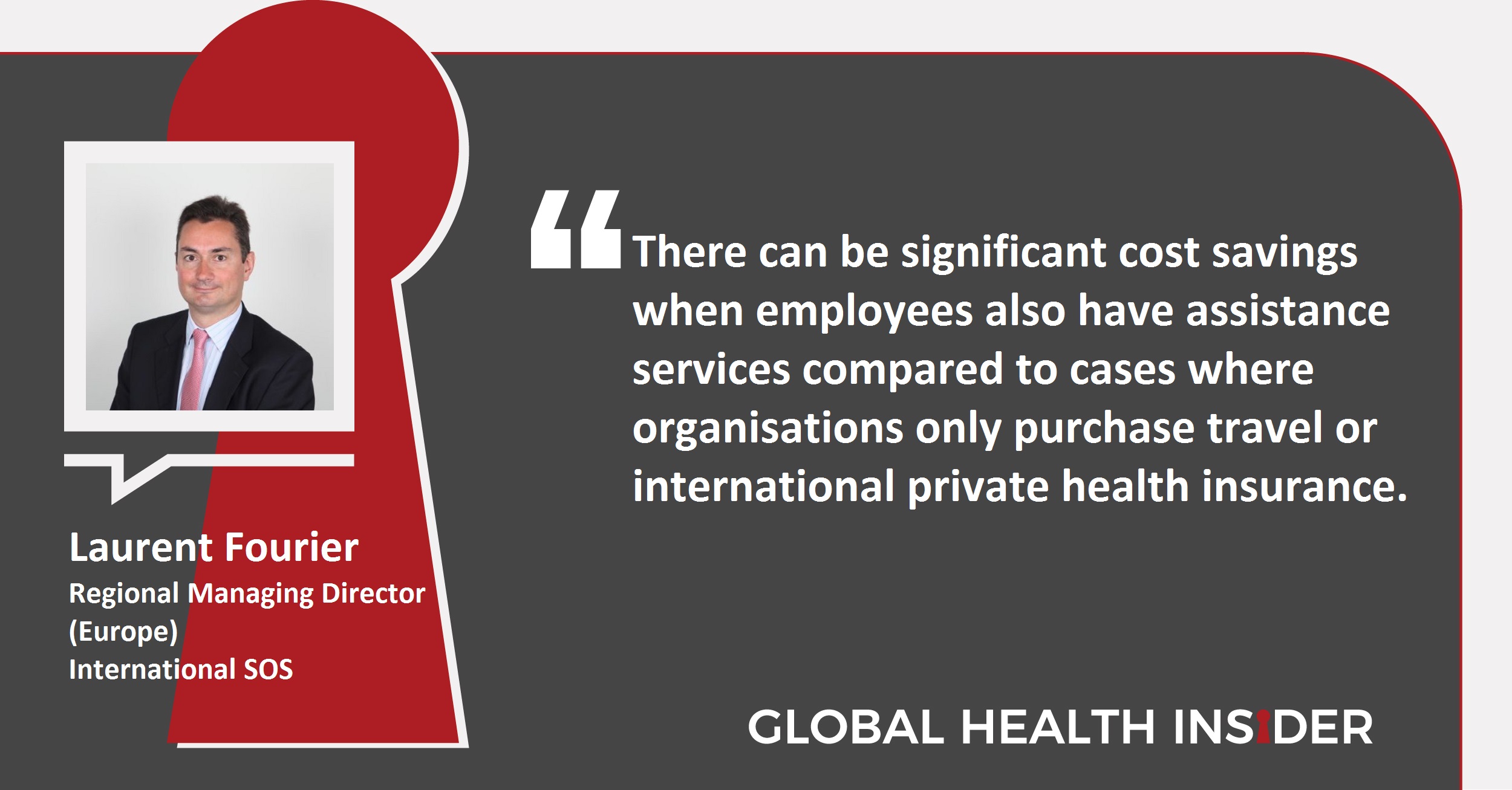Director of International SOS, Laurent Fourier Stresses the Need for Prevention

Mr. Laurent Fourier is the Director of International SOS, a medical and travel security risk services company covering 92 countries. Championing best organisational practices that mitigate risks and provide duty of care, International SOS has worked with various authorities to develop benchmarks and advisories over the years. More recently, its Foundation has launched an award to recognise exemplary companies, which have made significant effort to protect their expatriate staff.
In an exclusive interview with Global Health Insider, Mr. Fourier shared how International SOS takes a step further with its prevention services. Reducing health and safety-related costs incurred by staff overseas, he said its members stand to save more than companies that just rely on insurance alone.
Read more about his views on the current safety and healthcare risks below.
Q: Give us a quick description of your role and responsibilities at International SOS. What are the immediate goals you are looking to achieve and projects that you are handling?
I oversee the operations of International SOS in Europe. In addition, I have a global role in supporting thought-leadership via the International SOS Foundation, where our goal is to support organisations with understanding best practices and legal considerations to meet their health, safety and security responsibilities when sending workers overseas.
This year, International SOS commissioned BSI (British Standards Institution) to develop PAS 3001:2016; a code of practice to provide global organisations with a formal standard that describes best practices to mitigate risks and provide duty of care to their international assignees and travellers.
The PAS (Publicly Available Specification) will provide best practices on assessing risks to employees abroad and developing policies to prevent those risks.
In addition, we are partnering with leading law firms, Occupational Health Agencies and National Employers’ Federations around the world to develop whitepapers on legal considerations and requirements by country – invaluable tools for helping the global organisation understand risk mitigation requirements as they expand their operations.
The number of mobile workers continues to rapidly increase. PwC estimates a 50 per cent growth in mobile workers by 2020. This trend assures that Duty of Care will continue to be a very important topic for the global organisation in the years to come.
Q: How is International SOS positioning itself in the global healthcare and protection market?
We are constantly evolving. As global risks change, we need to expand services to support travellers and organisations. This includes everything from training employees on travel security risks to helping companies locate employees during a crisis and provide advice and assistance to those clients.
At the same time, we need to be agile and respond immediately to the risks of today. No matter what the destination, there are always risks for travellers and expatriates. What’s important is that overseas workers and organisations understand the risks and have processes and systems in place to mitigate those risks. Providing an integrated solution with prevention and response capabilities is a must for responsible organisations.
Q: What are the safety and healthcare risks that are often neglected globally? Is there anything currently that you wish to highlight?
While high-profile events like the Zika virus, Ebola and terrorist attacks get a lot of media coverage, in our experience it’s the everyday incidents that can catch people out. The biggest risks to people abroad are the everyday occurrences: petty crime, road accidents, falling ill.
What’s important is that travellers and those responsible for buying and approving travel understand the risks and their exposure to them for the destinations. They should be apprised of what’s happening in and around their destination – and – know what to do in the event an incident occurs that could affect their wellbeing and safety.
Q: How is International SOS partnering with healthcare and insurance industry players to further its cause?
Insurance is for sure a necessary part of doing business. However, it is not sufficient if an employer wants to fulfill its Duty of Care when sending their people abroad.
For businesses, it is worthwhile to purchase additional medical and travel security assistance services. We have found that there can be significant cost savings when employees also have assistance services compared to cases where organisations only purchase travel or international private health insurance. The prevention services provided by International SOS help clients understand potential risks at destination, thereby mitigating their exposure to the risks and the costs that could be incurred. It’s a win-win solution for members, organisations and the insurer.
Direct membership with International SOS gives organisations the basis for prevention with medical and security-led first call assistance, reducing health and safety-related risks and costs.
Q: International SOS Foundation started in 2011 and it has recently launched the first annual global Duty of Care Awards. Tell us more about them. What are the lacks in welfare for working expats that the Foundation hopes to address?
The International SOS Foundation launched the Global Duty of Care Awards to recognise organisations and individuals who have made a significant contribution to protecting their staff as they travel and work overseas.
A considerable amount of effort is involved across departments to support travelling staff. The goal of the awards is to recognise those involved in creating and implementing the programmes that mitigate travel, health and security risks to workers when they are abroad. We want to shine a light on best practices to raise standards in Duty of Care.
The Foundation has five goals:
- Study and research: better understand the health, safety and security risks linked to global mobility.
- Educate: provide information to workers and contractors, employers and governments on health and security risks.
- Strengthen corporate social responsibility in areas in proximity to worksites.
- Develop an international instrument for health and security risk mitigation.
- Disseminate information on risks to health and security in a variety of formats.
Q: What lies ahead for International SOS?
To continue to innovate in the field of medical and travel security services to help organisations achieve their goals and operate globally. We also look forward to sharing the win-win benefits of a coordinated case-management approach between organisations, assistance providers and insurance companies.


Leave a Comment
* Fields marked with this asterisk are mandatory.